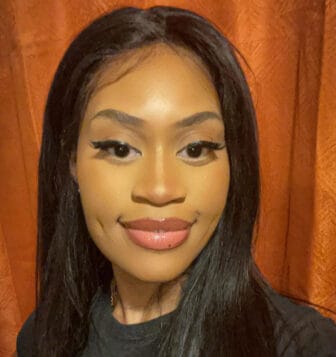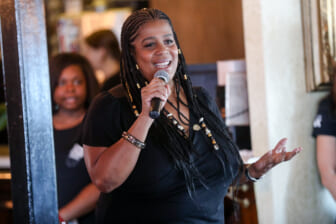The word “swag” may conjure the idea of “stylish confidence” (along with the lyrics from the great early-aughts song “Swag Surfin”). But have you ever considered that nature also has swag? With her book “Nature Swagger: Stories and Visions of Black Joy in the Outdoors,” author and outdoor enthusiast Rue Mapp reminds us of the original queen of swag, Mother Nature — and how we must plug back into her to unlock her greatness.
Published in Fall 2022, “Nature Swagger” is Mapp’s opus of gorgeous photography and captivating stories about Black lives and healing in nature. After founding Outdoor Afro in 2009 and growing it into a mega nonprofit organization that connects Black leaders in nature with the community in a network of educational and recreational programs in and all about nature, she decided to author a book documenting the spiritual healing and release she witnessed over the years. With a background in art history, Rue felt compelled to showcase a specific type of representation that is real and alive but often not visible in the mainstream.
Growing up, Rue did not see Black people enjoying nature, learning from nature, and spending time in nature in non-commercial ways other than sports, but that wasn’t her truth. Knowledge of nature and time spent in it has always been innate to the Black American experience but the impact of acts like Jim Crow laws, redlining, and sometimes simply our ignorance has kept many of us from taking advantage of Mother Earth’s majestic presence.
“The way that Black people have engaged with the outdoors is very spiritual and is found in the lyrics of the gospel songs we would sing in church— ‘I’m gonna lay down my burdens by the riverside,’ Mapp noted while in conversation with theGrio. “We’ve known that nature was there for our healing and where we could go.” Reflecting on her own background, growing up in both Oakland, Calif., and on a ranch about 100 miles north with Southern-born parents, Mapp added, “That was the story that needed to be told, and one that I felt even more convicted to tell especially after the murder of George Floyd. I felt like everywhere I turned there were monuments to pain and peril. I wanted to more urgently tell that story of our joy and our healing, and our potential to find connection and comfort.”
Nature Swagger and Outdoor Afro are just two of the ways Mapp continues to show up for our community, providing services that feed the soul with more ventures in development. Ahead of Earth Day 2023 (April 22), Mapp sat down with theGrio to discuss nature’s swag, art history, and Black joy. (This interview has been edited for length and clarity.)
TheGrio: Tell us about “Nature Swagger.”
Rue Mapp: “Nature Swagger” is the book of my dreams in a lot of different ways. One of the things that I started doing back in 2009 was storytelling and telling a new narrative of what the Black experience really could look like in the outdoors. That was a reflection of my growing up and that of many other people that I knew. That story was not being told. It was not being told in the glossy magazines of the day, which only showed people outdoors looking a certain way or doing certain activities.
My background is also in art history, so I recognize the need and the opportunity to tell stories across literacy through visual representation. And the same was also true that we just did not see people outside who looked strong, beautiful, and free in the outdoors back in 2009. So Outdoor Afro was the platform to tell that new narrative and shift that visual representation to one that felt more familiar to me but also was one that a lot of people shared but just weren’t able to see in the mainstream gaze.
That evolved to become an organization of people who get outside together…in this year’s class, we have almost 120 men and women who we invest in and train as Outdoor Afro leaders, like Oakland firemen or a South Carolina nurse, a Washington, D.C. preschool teacher, and so on; everyday people you find all up in your family are Outdoor Afro leaders. They’re responsible for getting people into the outdoors and now do so in over 30 states and nearly 60 cities. We have a participation network of 60,000 people who get out and hike, bike, camp, birdwatch, BBQ, you name it.
People were asking me what is the goal here. I was like, ‘Man, I just want people to have their nature swagger back.’ … I view my organization at large as a love story, and in that, love of who we are, but also where we’ve come from, and the joy.
TG: So that’s how the title came about — you just wanted people to get their nature swagger back.
RM: I already had that title before I even started writing the book. My publisher was like, “Well, you know, usually the title is something that goes through a process of discovery and marketing analysis.” I was like, “I don’t care. I’m gonna call it ‘Nature Swagger’ “… I was very clear that that was what the name of the book had to be because that was the vision. And that’s where the byline comes in — “stories and visions of black joy in the outdoors.”
And the other thing I wanted to accomplish — I didn’t want to just show off, peak adventures in the outdoors, like people dangling off the sides of mountains and stuff. I wanted to get into people’s real lived experiences with nature. So it gave people a chance to have a platform to talk about their nature, their joy in nature, and that nature shows up in a much wider variety of ways than just hiking, camping, and biking, which is pretty much what people think about when they think about the outdoors. I wanted to expand and open up those possibilities and pathways to nature that are less recognized [and] may be off the beaten path, but may connect with someone in their own life and walk with nature.
TG: Do you see a spiritual connection there?
RM: Yes, I think the way that Black people have engaged with the outdoors is very spiritual. … Read any Toni Morrison book, and it is just soaked with nature narrative. I think of the people, these historical figures who had a nature knowingness that they had to lean on and depend on to accomplish great things in our community. I think about Harriet Tubman, who was incredible…but when you get into the essence of what she had to do to lead people through wilderness areas in the cover of night, that kind of nature knowledge of how to navigate people to freedom was essential.
The question I think the book asks without quite asking it directly is, how do we, how can we plug into the power of the outdoors and nature to find ways that we can find freedom for ourselves, for our communities, and for anyone who is in our sphere of influence? … So there’s a lot; there’s the adventure, there’s the adrenaline, and there are all these different ways you can approach nature and outdoor experiences. … When I see people out tailgating at Raiders’ tailgate, and they’ve got all the cans of beer, I’m like “Y’all out here just doing day camps, stop playing.”
TG: Right! Describe what nature’s swag means to you.
RM: Well, nature’s swag is really like knowingness, confidence, and being in harmony with what’s around you. That nature swag might show up for you as you move through a farmers market and [think] “This is persimmon season, let me think about how I can incorporate that into my dessert-making plans for my soul.” It’s that integration of how we live in the cycles of nature and how those cycles of nature inform our daily lives and that confidence and knowingness, being able to apply that.
Privilege is not even adequate to tell you how I get to have this front-row seat to the transformation that happens in individuals and my community, through their connection to nature. All it has done for me is just sharpen my desire and resolve to continue to do this work because I see how people across all different economic backgrounds and different regions of our country can come together and realize their inner strength. … I swear, we get on these calls with the volunteers and it’s like church, where people are telling me what difference Outdoor Afro made in their life because they were allowed to see [new] parts of themselves, or to realize healing, or some form of transformation that they needed, that in some cases saved their life.
To learn more about Rue Mapp and the Outdoor Afro community, subscribe to the organization’s newsletter. “Nature Swagger” is available at major booksellers.

Noel Cymone Walker is an NYC-based writer specializing in beauty, fashion, music, travel, and cultural anthropology. She has written and produced visuals for several notable publications such as The Recording Academy/The Grammys, The Fader, Billboard, OkayPlayer, Marie Claire, Glamour, Allure, Essence, Ebony, and more.
TheGrio is FREE on your TV via Apple TV, Amazon Fire, Roku, and Android TV. TheGrio’s Black Podcast Network is free too. Download theGrio mobile apps today! Listen to ‘Writing Black‘ with Maiysha Kai.
.png)










 English (US) ·
English (US) ·